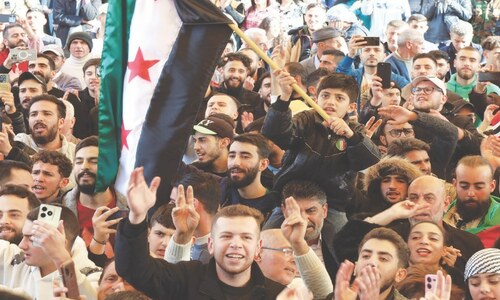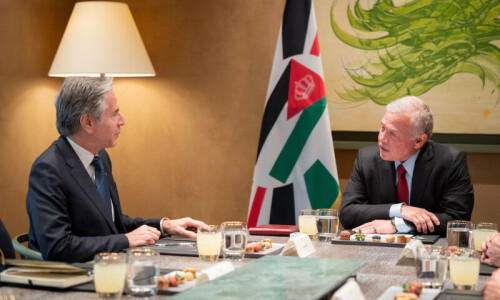• Trump calls rebellion an ‘unfriendly takeover’ by Turkiye
• EU says Russia has no place in Syria after Assad’s fall
TARTUS: A Syrian bunker complex outside the port of Tartus was ablaze and rocked by explosions on Monday just hours after what a war monitor and locals said was an intense wave of Israeli air strikes.
Even after the strikes ended, blasts continued to erupt in a valley outside the village of Bmalkah, a Christian community in the hills behind the city, which is home to Russia’s naval base in Syria.
Coming just over a week after Bashar al-Assad’s regime was ousted in a lightning rebel offensive, the raids targeted strategic sites and air defences along Syria’s western coast.
Israeli planes launched “the heaviest strikes in Syria’s coastal region since the start of strikes in 2012” overnight, according to the UK-based Syrian Observatory for Human Rights.
The hillsides around Bmalkah and the base, a cluster of concrete buildings and arched concrete bunker entrances cut into the hillside to protect stockpiled munitions, were littered with shrapnel. Missile launch tubes, mortar shells and damaged munitions were scattered on the ground and plumes of smoke rose from the terraced sides of the valley as parts of the arsenal continued to detonate.
“It was like an earthquake. All the windows in my house were blown out,” said 28-year-old Ibrahim Ahmed, an employee in a legal office who had come to a roadside viewpoint to look down on devastation.
Since Assad’s fall, Israel has targeted Syria’s fleet, chemical arsenals and air defence bases, trying to prevent the country’s weapons from falling into the hands of the new government.
Turkish move
Moreover, president-elect Donald Trump, while addressing a news conference on Monday, characterised the rebel ouster of Syrian strongman Bashar al-Assad by Ankara-backed rebels as an “unfriendly takeover” by US ally Turkiye.
“I think Turkiye is very smart… Turkiye did an unfriendly takeover, without a lot of lives being lost. I can say that Assad was a butcher, what he did to children,” Trump told reporters at his residence in Florida.
Turkiye has carried out military strikes inside Syria, and has said it is ready to provide armed support to the country’s new government set up by the rebels. Ankara’s top priority in Syria was to rid the country of Kurdish separatist fighters — a goal supported by the new government, it has said.
EU stance
Arguing Moscow has no place in the country’s future, EU foreign affairs chief Kaja Kallas said on Monday the bloc would raise the issue of Russian bases with Syria’s new leadership.
Russia, along with Iran, were the key backers of ousted Syrian leader Bashar al-Assad and propped him up militarily during the brutal civil war.
“Russia and Iran also should not have a place in Syria’s future,” Kallas said after a meeting of EU foreign ministers in Brussels. “Many foreign ministers took this up to say that, you know, it should be a condition for the new leadership that they also get rid of the Russian influence.”
Russia has two main bases in Syria — one naval and the other airforce — that serve as key hubs for bolstering Moscow’s sway in the region.
“It is a base where they also conduct their activities towards Africa and the southern neighbours. So this is definitely of worry to the European security as well,” Kallas said. “We will raise this issue with the leadership.”
European countries are scrambling to work out how to engage with the new authorities in Damascus, spearheaded by Hayat Tahrir al-Sham (HTS). The EU’s top diplomat on Syria on Monday travelled to Damascus and held his first meetings with the new powers since they ended five decade of Assad family rule, Kallas said.
Western powers are wary of HTS, given that the group had its roots in Al Qaeda and is listed as a terror group by a number of governments. Kallas said key conditions for cooperation included “inclusiveness of government, taking into account especially the minorities and women’s rights” and shunning extremism.
Syria’s economy has been hit by punishing EU sanctions during the war and HTS is also blacklisted due to its ties to Al Qaeda.
Kallas said the EU was looking at whether to start lifting its punitive measures “when we see positive steps, not the words, but actual steps and deeds from the new leadership of Syria”. “We need to have the plan ready when we see the steps, then we also are ready to act positively,” she said.
Published in Dawn, December 17th, 2024















































